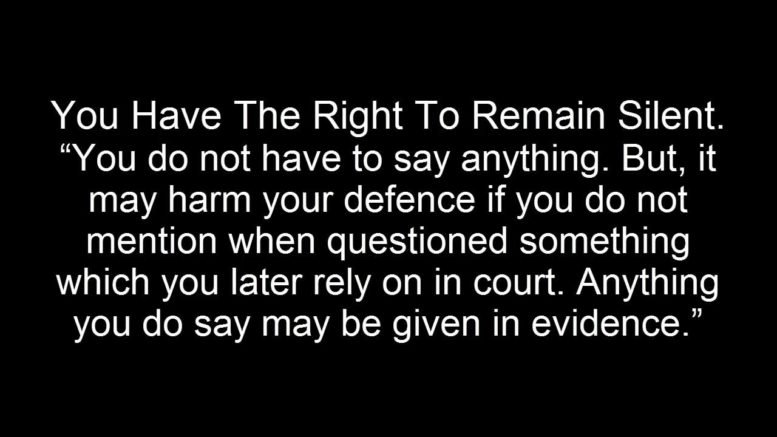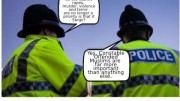I’ve featured the work of the excellent Crimebodge site before on here and today I have the opportunity to do so again. The UK government increasingly using unjust and capricious ‘hate speech’ laws in order to crackdown on the right of Britons to speak freely about the issues that bother them. With this crackdown comes the increased likelihood that more and more ordinary and ostensibly law abiding British people will find themselves at the wrong end of a police investigation. A number of these individuals may end up being dragged off to police stations not because they’ve stolen or harmed someone, but merely because they’ve expressed an opinion that someone somewhere has decided that they are ‘offended’ by.
The increase in arrests for what are in effect ‘thought crimes’ will bring Britain’s increasingly politically bent police forces a bounty of low hanging fruit in terms of cautions and convictions under ‘hate speech’ laws. This ‘hate speech’ sweep will continue to oppress Britons unless of course those arrested stop talking to the police and thereby giving the police a rope with which the arrestee can be metaphorically hanged.
The author of the Crimebodge piece states that when arrested the first impulse of the arrested person may be to try to explain themselves to the police or to try to mitigate the circumstances or even to crumble in the face of police threats or intimidation. As the Crimebodge piece says, talking to the police does no good, the police will only use whatever you say against you. The police are not interested in your story apart from what material it may give them to drop you further into the legal mire.
I would strongly advise you to read the Crimebodge piece, it may save your liberty if you are ever arrested on some shonky and unjust ‘hate speech’ charge. Here’s part of the Crimebodge piece and it’s well worth clicking through to the Crimebodge site to read the whole piece.
Crimebodge said:
People seem to have an almost reflexive urge to talk when confronted by authority. Watch any police reality show and you will see this in action. From the moment a person is stopped all they want to do is talk: excusing, apologising, lying, arguing, confessing, denying, bargaining. The only time these people pipe down is when they are being arrested; perhaps because only then do they realise how fruitless talking themselves out of trouble has been.
Want to know what the best way is of communicating with the police?
DON’T!
There are no ifs or buts. No special circumstances. No benefits to be had. If you find yourself on the receiving end of police questions, there is no reason to talk. NOT EVER. It doesn’t matter if they have stopped you in the street, pulled you over for speeding, knocked on your door or are interviewing you down at the station. Tell them nothing.
Don’t profess your innocence. Don’t make denials. Don’t argue with them. Don’t chat with them. Don’t complain. Don’t make excuses. Don’t talk to them on the phone. Your aim should always be to foreshorten any encounter you have with the police. The more you say, the longer they will remain. The quickest way of leaving any unwanted encounter with the police is to say as little as possible. If you must say anything then simply ask if they suspect you of having broken the law. If the answer is anything other than “yes,” then leave.
It’s not your job to prove your innocence to the police. It is their job to prove your guilt. Being friendly and open with them will do you no favours. Do you honestly think that if you give them details and excuses they will take pity on you and let you go? All the backstory you give and protestations of innocence you make, they won’t be listening to. Instead, they will be sifting through everything you say to find something, anything, that sounds like an admission of guilt.
This isn’t me being cynical, it’s how police officers are trained. Suspicion is a tool of their trade. They hear people trying to convince them they haven’t done anything wrong every day. So why would they treat you any differently? They won’t. In fact they’ve probably heard a dozen people like you that very day, whereas you might be encountering a cop for the first time in years.
Yes, it’s frustrating to protest your innocence and get nothing but blank looks or probing questions from a cop, especially if you really are as innocent as you say you are; but what sounds like innocence to you, sounds very different to them. As far as the police are concerned, talkers are just guilty people trying to sound innocent.
Brilliant advice there from Crimebodge. You have the right to remain silent – so use that right. You can read the entire Crimebodge article by clicking on the link below.
http://crimebodge.com/why-silence-is-your-greatest-defence-against-the-police/




